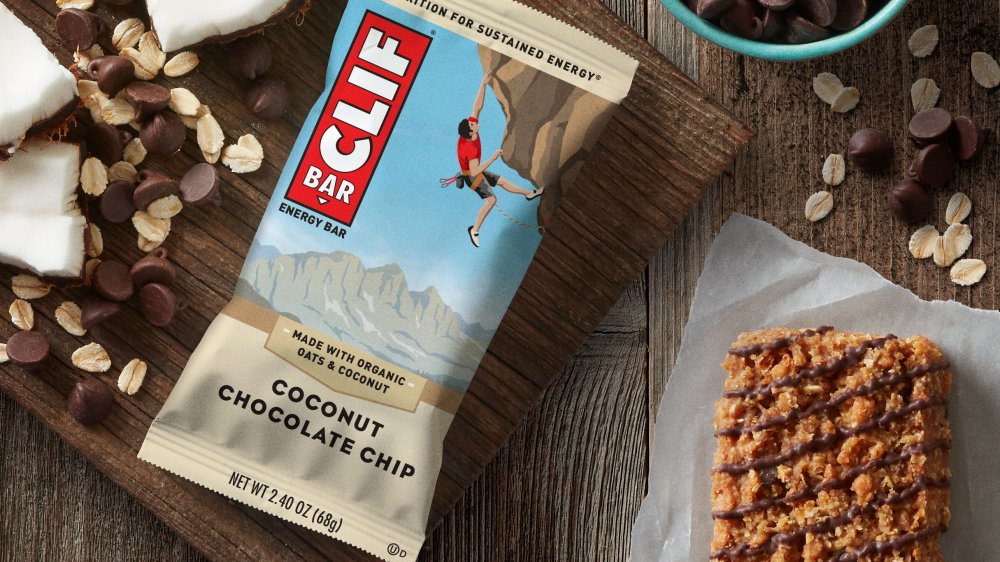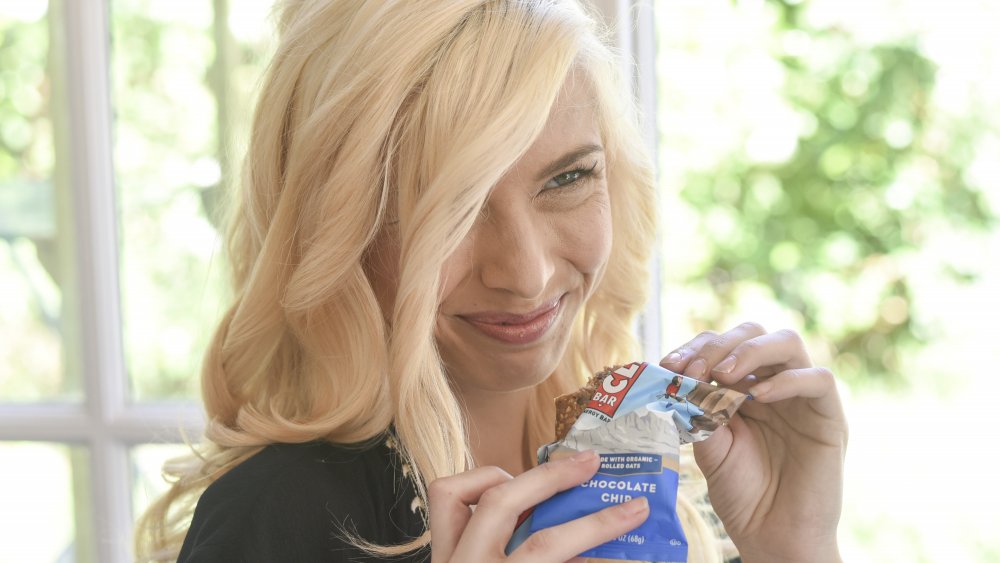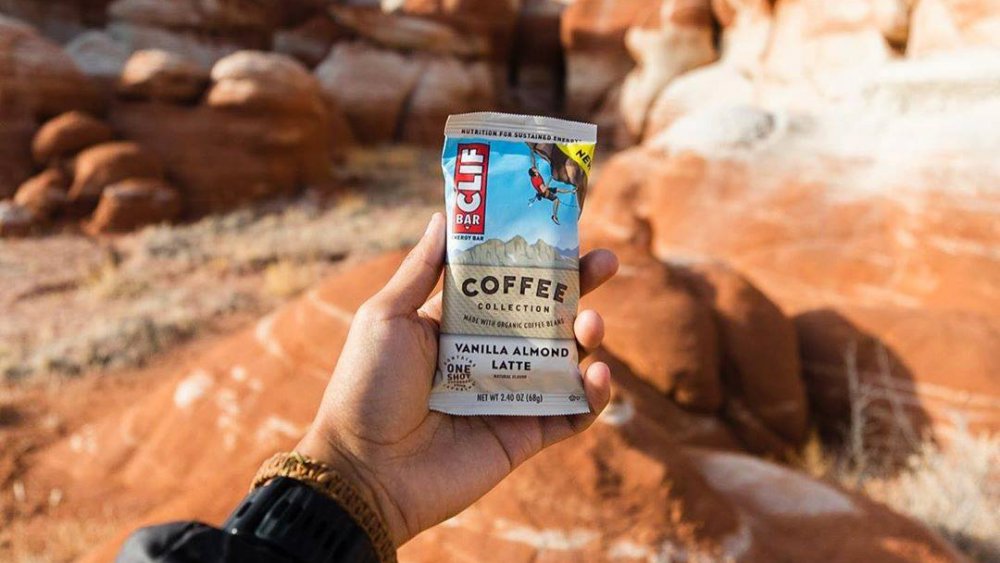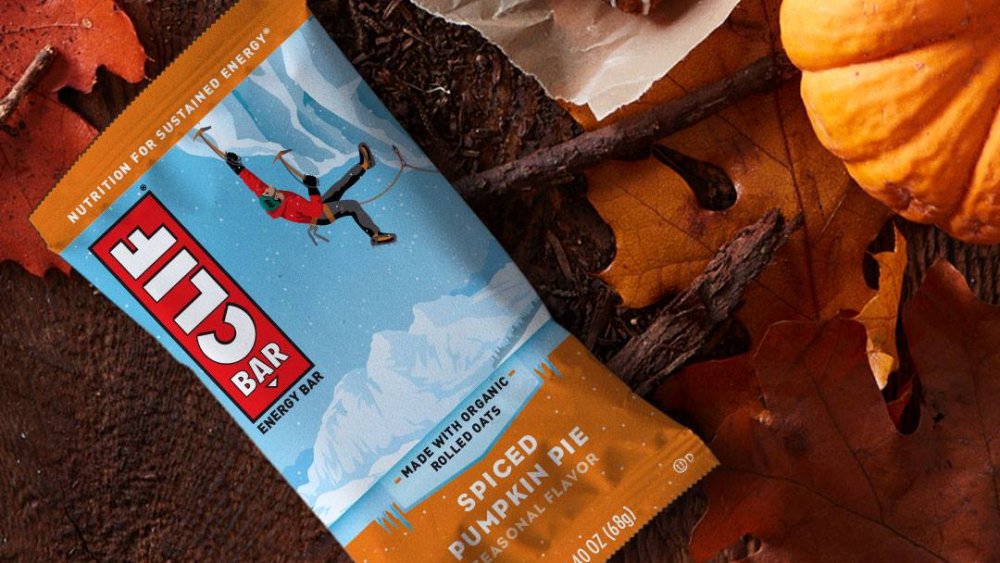The Untold Truth Of Clif Bars
We may receive a commission on purchases made from links.
These days the energy bar aisle in the grocery store is packed floor to ceiling with offerings containing everything from your garden variety ingredients like grains and dried fruit, to bison meat, and chicken with Sriracha (via Epic Provisions). The selection used to be significantly more limited.
One bar which predates many of the new keto and gluten-free options is the Clif Bar, with its distinctive label of a rock climber undertaking what appears to be a very nail-biting climb. Newer iterations have introduced famous athletes like Venus Williams and Megan Rapinoe in sporty poses (via Amazon).
Back when there were just a couple of options, a Berkeley-based bike seat factory worker named Gary Erickson had an epiphany while on a 125-mile bike ride around the Bay Area. He and his friend brought a half dozen energy bars with them, and to hear Erickson tell it on an NPR interview in 2016, "I looked at the sixth one, and I just said, no way. I can't do one more. I would rather starve than eat another one of these. And I turn to my friend Jay, and I said, you know what? I can make a better energy bar than that."
He set up shop in his mother's kitchen, though his mom had no idea what an energy bar was. Erickson explained it was essentially an oatmeal chocolate chip raisin cookie, without the butter, sugar, or oil; at first she said that was impossible!
A family business
After a few months spent perfecting the recipe, the Clif Bar was introduced in 1992, and named after Erickson's father, Clifford (via Clif). In addition to sharing his son's love for the outdoors, Clif also encouraged his son to follow his passions. The company was soon successful with cyclists and climbers, and gained marketshare at grocery stores nationwide.
The bars' flavors — like Blueberry Crisp, Crunchy Peanut Butter, and Chocolate Chip — set Clif apart. Simple ingredients you'll find inside: rolled oats, dried fruits, nuts, and seeds. Clif bars are 70 percent organic, and free of trans-fat, high fructose corn syrup, GMOs, or artificial flavorings.
Outside of the bars that made them famous, Clif eventually introduced products like energy gel pouches, energy chews, and electrolyte drink mixes. Today, the company's portfolio also includes Luna bars, which are marketed toward women, and Clif Kids, among other products.
Today, Erickson is still co-CEO of the company along with his wife, Kit Crawford. However, he was once close to signing everything away in 2010, when Quaker Oats offered him $120 million to purchase the brand (via Inc). He was nearly convinced to sell the company but on the way to his lawyer's office to sign the papers, Erickson decided to pull out of the deal. "This is my life," he told interviewers, "and these are our employees, and this is my family, and it's named after my dad."
Clif's guiding principles
One thing that sets the company apart from competitors is that it's particularly interested in giving back to employees, and the communities in which they operate. This has led to some fairly significant business decisions, as Erickson cites it as one of the reasons he decided to stay private. Staying private gave him free reign over developing a model which calls for "sustaining our business, brands, people, community, and the planet," without the interference of public shareholders. These guiding pillars of the company are what they refer to as the Five Aspirations.
Their commitment to the planet isn't only something that looks good on paper, Clif has been following through on their sustainability promise for years. In 2002, the company headquarters was awarded LEED (Leadership in Energy and Environmental Design) Platinum certification, which is the highest standard a building can earn when it comes to sustainability. Some 85 percent of the company's waste is either recycled or composted. Another positive environmental step the company has taken was to certify all the cocoa used in chocolate-flavored bars comes from Rainforest Alliance Certified farms (via Clif).
Dedication to employees
Today, Clif Bar is based in Emeryville, California, and employs some 1,200 people. The energy bar maker — whose offerings are vegan, and also include Energy Granola, as well as gluten-free products — is regularly ranked as one of the best companies in the country to work for. Employees at the company are always encouraged to volunteer — even within the workday.
In 2010, the Employee Stock Ownership Plan was introduced. While Erickson and his wife still own 80 percent of the company, employees collectively own 20 percent. Because they are a private company, Clif is not required to disclose their earnings, but estimates suggest that the company brings in somewhere between $500 million and $1 billion annually. Not too shabby for a project that started out in a home kitchen following what turned out to be a very fortuitous bike ride.



